MANAGE WATER RESOURCES SUSTAINABLY
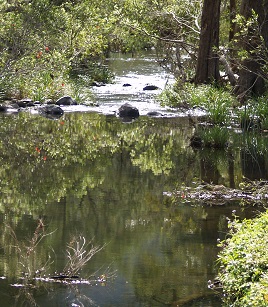
The world does is running out of water. We have to do more. Find out more about water conservation and water management with this specialist and detailed course.
The world doesn't have sufficient water of adequate quality for the current population -and things are set to get worse.
- Learn to better understand water -appreciate its value, understand it's characteristics, and explore solutions for its management.
- Learn to manage water for improved sustainability at home or work
- This is a valuable course for farmers, horticulturists, plumbers, irrigation industry staff, environmentalists, etc
- 100 hrs, 10 assignments, self paced study, expert tutor support
LESSON STRUCTURE
There are 10 lessons in this course:
1. Introduction to water conservation
- Importance of water
- The water cycle rainfall, evaporation, infiltration, effective rainfall
- Water sources and storage water quality
- Facts on water uses water use at home, in primary and other industries
- Why conserve water personal, regional and global significance
2. Water conservation at home
- In Australia
- In the United Kingdom
- In the United States
- Measures undertaken to save water in the home in the kitchen, bathroom and in the garden.
- Water Saving Devices
3. Water conservation in the workplace
- General principles
- Implementing water saving strategies
- Installing small appliances
- Large water saving devices
4. Water management
- Water quality maintaining water quality, salinity, chemical contaminants
- Controlling Use and Quality of Water water flow measurement, water quality control, testing water salinity
- Preserving Water Quality minimising evaporation, water sanitation
- Water Audits
- Water Management Plans
5. Water conservation in Primary Production I
- Water Saving Measures
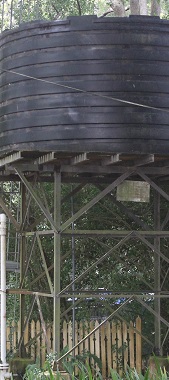
-
Water Wise Plants
- Water Wise Procedures
- Water Wise Irrigation systems
- Water Wise Landscaping
- Equipment, structures and tools to save water
6. Water conservation in Primary Production II
- Use of water in primary production
- Methods of water storage
- Rainwater collection and storage
- Bore water
- Farm dams planning, lined ponds
- Water Requirements livestock requirements, domestic requirements
- Water Quality
- Water Problems on Farms contamination and disposal of water, evaporation, seepage, runoff, overspray, scheduling
- Using Farm Waste Water
- Irrigation System Design
- Maintenance Procedures and Scheduling
- Surface/Flood Irrigation
- Sprinkler Irrigation
- Swales and Keylines
7. Water conservation in Services industries
- Use of Water in Services Industry
- Contamination and Disposal of Water
- Reduce/Reuse/Recycle
8. Water conservation and Health
- Hospitals, nursing homes, laundries, clinical laboratories, dental practices, human and animal research facilities
- Uses of water in Health Industry control pathogens, general use
- Water minimisation
- Water efficiency
9. Water conservation in other sectors
- Use of water in manufacturing, construction and heavy industry
- Water use in the production process
- Examples of water using activities in food facilities
- Water holding
- Benefits of cleaner production
10. Water treatment, reuse and recycling
- Water Sanitation filtering and disinfection
- Water Reuse and Recycling classification and composition of waste water.
- Recycling Wastewater
- Wastewater treatment
- Suitable plants
- Treating saline water
Each lesson culminates in an assignment which is submitted to the school, marked by the school's tutors and returned to you with any relevant suggestions, comments, and if necessary, extra reading.
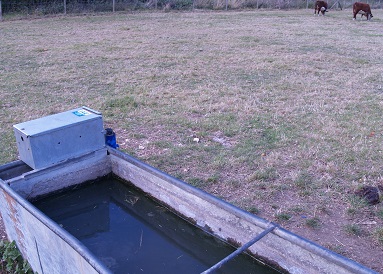
Aims
- Explain the importance of water in the world and the reasons for its sustainable conservation and management.
- Explain the importance of water conservation and methods to save water at the workplace.
- Explain the importance of water conservation and methods to save water at home.
- Explain water flow and quality control.
- Explain water audits and water management plans.
- Explain the importance of water conservation and methods to save water in Horticulture
- Explain the importance of water conservation and methods to save water in Agriculture.
- Explain the importance of water conservation and methods to save water in the Services Industry.
- Explain the importance of water conservation and methods to save water in the Health Industry and allied services.
- Explain the importance of water conservation and methods to save water in other occupations.
- Explain water sanitation and wastewater treatment methods and the difference with water reuse and recycling.
WHY TO CONSERVE WATER: PERSONAL, TERRITORY AND GLOBAL SIGNIFICANCE
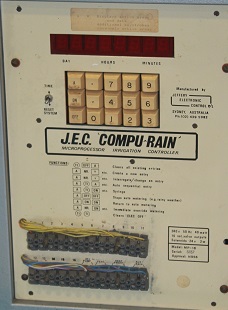 Human beings cannot survive more than 3 days without any source of water. Neither can other animals or plants. Water is life. Water is needed to move, eat, reproduce, work and think, in other words, to survive and to live.
Human beings cannot survive more than 3 days without any source of water. Neither can other animals or plants. Water is life. Water is needed to move, eat, reproduce, work and think, in other words, to survive and to live.
Water resources are challenged in our world today due to pollution and overuse of the local resources. There are also fights for water between different users: farmers, people in cities and industries. There also rivers that cross frontiers, and thus there some problems in the sharing and use of the water between different countries. We are using much more water than what is really needed and available in many locations around the world.
This is due sometimes because of lack of water, but more often it is due to a bad management of the water resources available, bad or non existent urban planning and bad or non existent population planning.
We are also wasting our water resources when we are discharging our wastes and sewage into it, making the receiving waters unsuitable for life and in many cases even unsuitable for industrial or agricultural use.
These are the main reasons to preserve our water resources. There are many ways to do so. Water conservation needs to be addressed through the three environmental R’s:
1. Reduce water use and water losses. This is also called water saving or minimization. Cleaner Production is a term used to describe all the actions taken to minimize the use of resources, water, energy or materials, that are used in our daily life (at home) and in our productive activities, such as industries, crops, health industries, office work (yes, water is also used, even minimally), etc.
Water reduction is the first step in water conservation as it is the most important factor in using water more efficiently. We reduce our water use at home when we use “water savers” in the shower. In gardening we save water when we use drip irrigation, instead of surface watering.
2. Reuse: Once water use has been reduced, we can study how we can use water that has already been used once. This is done normally with water that is not heavily contaminated with wastes. We can reuse shower water, but not water used to flush the toilets.
We are reusing water at home when we are using our grey water (from washing) to water the garden. Some industries can reuse water so effectively that they don’t produce any waste water. There are nowadays very efficient technologies to that effect.
3. Recycle. This is the third step, and generally it includes some type or technology the clean the water and use these recovered water. In rural houses, water from flushing the toilets can be cleaned with several simple and affordable technologies. This water can then be used to water trees. In Israel, in very dry areas with great shortage of water, sewage water is cleaned and disinfected so well, that it is being used to supply part of the drinking water. It is an expensive technology, but it can be done if there is no another solution to provide water to the population.
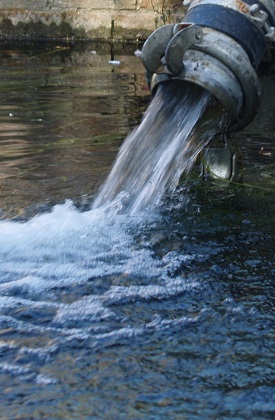 MAINTAINING WATER QUALITY
MAINTAINING WATER QUALITY
Water quality is affected by the type and amount of impurities:
- Physical contamination is particles in the water, like silt due to erosion
- Chemical impurities are substances dissolved in the water, like salt, fertilizers, oils, pesticides and other chemical residues
- Biological impurities are living organisms such as algae and some micro-organisms. Bacteriological contamination is biological and it is extremely important to human and animal health.
Rain or creek water is unlikely to have serious physical or chemical impurities, like high levels of fertilizers, pesticides or oils, but may develop algal problems, particularly if exposed to light and if nutrient levels (normally due to chemical contamination with fertilizers in the creek basin) are high. Bacterial impurities may develop if this water is stored improperly or contaminated with grazing animal’s droppings and urine.
Bore or spring water hardly ever has physical or algal impurities, but may contain salts (causing hardness). Bore water may also contain iron, and in agricultural areas can have nutrients and pesticides. Bore water near industrial areas or cities may have chemical contaminants like oils and its residues and other chemical contaminants that will depend on the industries nearby.
River or channel water is likely to have biological impurities (eg. algae) as a result of fertilizer contamination and may have chemical and physical contamination, depending on the source. If the river comes from a contaminated water basin (the geographical area where rain water falls and gathers in a sole river), water may contain chemicals. This may happen when there are industries or mining activities upstream.
Dam and irrigation water generally contains few chemical or biological impurities if properly managed, but may have sediment or other physical impurities and may develop medium levels of bacteria and nutrients, particularly if animals are allowed to foul the water. If the water is rich in nutrients due to agricultural runoff, then algal blooms are likely to develop (eutrophication).
The quality of water may be found by testing a sample. This is normally carried out by such organisations as:
- Environmental laboratories, university laboratories or university scientific services
- Companies that sell equipment for the treatment of water
- Local organisations such as dairy factories and water treatment trusts
- Departments of Agriculture, Primary Industries or similar bodies
- Departments of Mines or similar bodies
- Departments of Health
- Water supply authorities
When you have completed an ACS course, you will have not only learnt about the subject, but you will have been prompted to start networking with experts in the discipline and shown how to approach problems that confront you in this field.
This and every other industry in today’s world is developing in unforeseen ways; and while that is unsettling for anyone who wants to be guaranteed a particular job at the end of a particular course; for others, this rapidly changing career environment is offering new and exciting opportunities almost every month.
If you want to do the best that you can in this industry, you need to recognise that the opportunities that confront you at the end of a course are probably different to anything that you even been thought of when you commenced the course.
WHAT NEXT?
Register to Study - Go to “It’s Easy to Enrol” box at the top of the page and you can enrol now.
or
Get Advice – Email us at info@acsedu.co.uk OR
Use our FREE COUNSELLING SERVICE to contact a tutor
CLICK TO CONTACT US